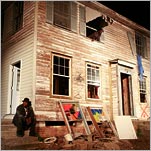In salvos of intransigent oratory, Israel and its Arab neighbors said today that they all hoped to end the bloodshed in their region, but disagreed about almost everything else -- who was at fault, what to do about it, even where further peace talks should be held.
On a day when the Palestinians at last found their place at a major Middle East peace conference, the Arabs demanded that Israel stop creating settlements in occupied territories and give up territory it had taken from Arabs in 1967. The Israelis in turn demanded that the Arabs recognize Israel's right to exist.
Each accused the other of deception, brutality, treachery and aggression, exactly as they have done for most of the 43 years that they have been at each other's throats. Both Sides Listen
But for the first time, representatives of much of the Arab world listened across the same table to an Israeli leader denouncing them, remaining in their chairs throughout, and the Israeli leader, Prime Minister Yitzhak Shamir, listened to their replies. He stayed put even though the Palestinian delegates identified themselves in so many words with the Palestine Liberation Organization, something the Israelis had said could prompt them to walk out.
In one especially heated passage, Farouk al-Sharaa, the Syrian Foreign Minister, accused Mr. Shamir of "faking facts and history." [ Excerpts from speeches, pages A10 and A11. ]
In reply, at a later news conference, Benjamin Netanyahu, an Israeli Deputy Foreign Minister, accused the Arabs of complicity with Hitler, Himmler, Ribbentrop and Eichmann in planning the Holocaust, and said Syria had spoken in terms of "vituperation, slander and condescension." Less Rigidity Expected
"These are just their opening statements, maximalist bargaining positions," a senior American official said. "A lot of it is for television and the political audiences back home. People will start to soften their ideological rigidity once face-to-face negotiations get under way."
But other top-level Americans who have worked for months to bring Israel, Syria, Lebanon, Jordan and the Palestinians together in Madrid expressed disappointment at what one called the "truculent tone" of today's speeches. None could point to any overt sign that the participants were ready to yield ground in the private, direct talks scheduled to start Sunday.
Indeed, it was unclear when, where and even whether those talks would begin. The Israelis and the Arabs remained deadlocked tonight, despite mediation efforts by Secretary of State James A. Baker 3d, over Mr. Shamir's demand that they be held in the Middle East, with a first round in Israel. The Arabs insisted that the plan had always been to negotiate in Madrid and argued that they would be recognizing Israel, in effect, by going there.
There was even some doubt expressed that the single organizational session that everyone had agreed to for Sunday at the Royal Palace in Madrid would go forward as planned.
The Palestinians said explicitly for the first time that they would accept limited self-rule in the occupied West Bank and the Gaza Strip as an interim stop on the way to statehood. In accepting the terms of invitation to the conference, they had implictly said the same thing, but some saw an incremental step forward.
Israel accepts the idea of limited autonomy, which it had agreed to in the 1978 Camp David agreement with Egypt and the United States, but rejects the idea of Palestinian sovereignty. Nonetheless, there has been very tentative talk among the Palestinian delegates and others here in the last 48 hours of some form of eventual confederation, possibly economic, possibly economic and political, involving Jordan, Israel and some sort of Palestinian entity. Jordan Faults Radicals
There was also a small conciliatory note from Jordan. Its delegate urged both sides to work for "the dawn of a new era" and pointedly called on Arab radicals to shed their rigid ideologies.
So the initial two days of the conference here, the first of which was dominated by speeches by Presidents Bush and Mikhail S. Gorbachev, have developed into a microcosm of the Middle East, marked by hopeful words from the great powers, hateful words from the countries of the region and fragile theorizing about what might be. So far, Madrid has been spared the physical violence that has long disfigured the eastern end of the Mediterranean.
The mood inside the 18th-century conference hall, with its marble columns and pilasters, its glittering chandeliers and immense Renaissance tapestries, was somber and businesslike. There was little applause after the day's five speeches, ranging in length from 30 to the full 45 minutes allowed.
Mr. Shamir opened this morning's session with a blunt warning that Arabs would lead negotiations into an impasse if they proceeded immediately to demand the return of the remaining land Israel captured in the 1967 Middle East war -- the West Bank, the Golan Heights and East Jerusalem. Israel returned all of the Sinai captured from Egypt in 1967 as part of the 1979 peace treaty with Egypt. Earlier Hostility Noted
"We know our partners will make territorial demands on Israel, but an examination of the conflict's long history makes clear its nature is not territorial," Mr. Shamir said. He argued that the Arabs had been equally hostile to Israel in the years when Israel was within its original borders, after the 1948 war and the truces of the next year, and he made no mention at all of the United Nations resolutions calling upon Israel to virtually return to the pre-1967 borders.
Nor did the grim-faced Prime Minister, who spoke in English, offer any hint of a concession to the Arabs on East Jerusalem, site of Arab as well as Jewish holy places, which is now occupied by Israel, or on the rapidly expanding Israeli settlements on captured Arab land. The Palestinians fear that the settlements will soon be so extensive that there will be no room for a Palestinian state.
Mr. Bush's appeal on Tuesday for territorial compromise appeared to have left Mr. Shamir unmoved, although some Israeli doves said the Prime Minister at least had not made what one called a "not one inch" speech.
Jordan came next, and its Foreign Minister, Kamal Abu Jaber, a onetime professor of politics, opened with the same word as Mr. Shamir: "Peace." That is a traditional greeting in both Hebrew and Arabic. Conquest Is Challenged
The Jordanian delegate focused sharply on United Nations resolutions embodying the principle that land must not be acquired by force of arms.
Apparently frustrated by Mr. Shamir's hard line, Mr. Abu Jaber later demanded at a news conference, "If we can't talk about Jerusalem, if we can't talk about withdrawal, what on earth are we doing here?"
Mr. Shamir had invited the delegations to begin the face-to-face talks in Israel, remarking, "There is no better way to make peace than to talk in each other's home."
Mr. Abu Jaber replied, "The momentum in Madrid is good, the spirit in Madrid is good, and we should keep the talks here."
The Israel Ambassador to the United States, Zalman Shoval, told Reuters, "One meeting and one meeting only can take place in Madrid." Arabs Insist on Madrid
But the Syrian Foreign Minister, Mr. Sharaa, said, "The conference opened here and will continue here."
A Palestinian spokeswoman, Hanan Ashrawi, said, "The Palestinian position is that there can be no bilateral negotiations in Israel as long as Israel occupies Palestinian territory."
It was not clear whether or not the Israelis were bluffing, but several times they threatened to break up the conference. Mr. Shamir said on the "MacNeil/Lehrer Newshour," for instance, that if the Arabs persisted in their view, "we will not have bilateral negotiations, and there will not be any continuation and there won't be any practical results."
But the day's high drama came in the appearance of the Palestinians, and the chief Palestinian negotiator, Dr. Haidar Abdel-Shafi, played the moment for all it was worth, speaking not only to those listening in person but also to a global television audience.
"We come to you from a tortured land and a proud though captive people, having been asked to negotiate with our occupiers," said the 72-year-old physician, a lean and aristocratic man who was briefly expelled from his native Gaza in 1967 by the Israelis. Looking down the plain white cloth covering the T-shaped table to Mr. Shamir, he called out, "Set them free!" Arafat Is Invoked
Dr. Abdel-Shafi all but dared the Israelis to walk out, not only invoking the name of Yasir Arafat, the Palestine Liberation Organization leader with whom Mr. Shamir refuses to deal, but also referring to "our acknowledged leadership, clearly and unequivocally recognized by the community of nations, with only a few exceptions." The speech was reportedly approved by Mr. Arafat in telephone conversations with Dr. Abdel-Shafi Wednesday.
Mr. Shamir just sat there, now drumming his fingers, now closing his eyes. He wrote notes furiously and passed them to aides sitting behind him.
A new state of Palestine "must be born on the land of Palestine to redeem the injustice and destruction of its historical reality and to free our people from the shackles of victimization," Dr. Abdel-Shafi declared.
"The people of Palestine look at you with a straightforward, direct gaze, seeking to touch your heart, for you have dared to stir up hopes that cannot be abandoned," he said to the conference organizers. "You cannot afford to let us down, for we have lived up to the values you espouse."
For his part, the Lebanese Foreign Minister, Faris Bouez, renewed his Government's demand that Israel pull its troops out of the 400-square-mile section of Lebanon that lies along Israel's northern border, an area he compared to "a vital limb." The occupation and the fighting accompanying it "have cost Lebanon and the world dearly," the 36-year-old official said. Toughest Line by Syria
The toughest line was taken by Syria's chief delegate, Mr. Sharaa, who said it was Israel's bellicosity that had kept the Middle East at war or on the brink of it for decades. He also accused the Israeli Government of inhumane treatment of Palestinians who live in the occupied territories.
"It is no exaggeration," the minister said, according to the official translation of his Arabic text, "to state that the continuing intransigence is a position which is bereft of any justification and is the one thing that places the world on the brink of incalculable danger."
He added: "Peace and the usurpation of the land of others cannot co-exist. Every inch of Arab land occupied by the Israelis by war and force -- the Golan, the West Bank, Jerusalem -- must be returned in their entirety to their legitimate owners."
On Friday, each of the five delegations will make a rebuttal speech.















